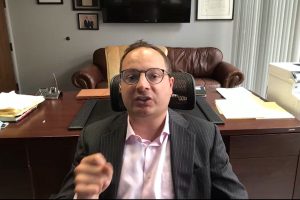Info-Packed and Detailed: Silverstein’s “Cam Law 101” YNOT Session
 On the first day of the all-virtual YNOT Summit last week, attorney Corey Silverstein delivered a presentation titled “Cam Law 101” – a name that didn’t fully capture the detailed and information-dense talk Silverstein led on the issues at hand. (To watch the full session video, click here.)
On the first day of the all-virtual YNOT Summit last week, attorney Corey Silverstein delivered a presentation titled “Cam Law 101” – a name that didn’t fully capture the detailed and information-dense talk Silverstein led on the issues at hand. (To watch the full session video, click here.)
Silverstein began the session by imploring models to remember that in their line of work, “you are your business,” a fact that argues strongly for setting up a Limited Liability Company (LLC) from the very start, the attorney asserted.
Using cam model Lacey Bloom, a Summit attendee who was among the viewers of his session, as an example, Silverstein told the audience to remember “ultimately, if your entire brand is you — which it is – then Lacy Bloom is everything.”
“So, Lacy Bloom should be an ‘entity,’” Silverstein said, adding that while Lacey Bloom should be an entity, it should be an entity not literally named “Lacey Bloom.”
“When I say an entity, there should be some LLC out there – it shouldn’t actually be Lacey Bloom, LLC,” Silverstein said, adding that this was “kind of an important little sub-note for everyone.”
“When you’re forming your company, don’t make it your name and don’t make it something that identifies with adult,” Silverstein said. “The reason is, of course, that when eventually you go to get your business bank account and they see, for example, your screen name is ‘longlegs@likestofuck,’ we’re going to have a problem getting a bank account, so we gotta stay away from that.”
One of the primary reasons to form an LLC is to limit your direct liability, Silverstein explained.
“By having a business, what you’re doing is instead of you being individually liable for everything that goes on, you have a business,” Silverstein added, noting that with an LLC, “just like a corporation, you get protection from lawsuits, you get protection from different state and federal laws that you’re gonna want.”
The other big benefit to forming a company is “good, old-fashioned taxation,” Silverstein noted.
“There are benefits to setting up an LLC and having a business entity as a cam model,” Silverstein said. “As a cam model, a lot of times, you don’t think about a lot of the expenses you have that are deductible. For example, camera equipment, new laptop, your new website designer — believe it or not, even costumes, outfits, sex toys could even be an extreme (example).”
In response to a viewer who noted that a performer’s rent can be deducted too, Silverstein confirmed this but added an important caveat.
“A portion of whatever you’re renting would have to be designated your ‘office space,’ so then you can actually deduct that portion,” Silverstein explained, noting that with the way the tax code is structured, “if you have a home office, you can’t just claim your entire rent – you can only take the proportional share of what’s being used for the office space.”
“So, if you have a $4000 apartment rent and say you’re only using 20% of the entire square footage for your shoot studio, well then at that point the only thing you’d be able to deduct is 20%,” Silverstein observed.
When one viewer commented that she has heard Corey recommend setting up an LLC many times, but she has yet to do it, Silverstein said one thing people should understand about setting up an LLC is that the process is “not that complicated” – or particularly expensive.
“There are services out there that can help you create a Delaware LLC that are – literally we’re talking about probably less than $300/$400 bucks to get you everything you need, including the company set up, a registered address, because all LLCs need a resident agent,” Silverstein said. “That’s the person who’s willing to accept service on behalf of the entity.”
Silverstein also cautioned the audience, however, that not all these services are created equal. When one viewer noted that people can use Legal Zoom to set up an LLC, Silverstein immediately responded that he does not recommend using Legal Zoom to set up your LLC – at least not as a cam performer or other manner of adult business or entrepreneur.
“The problem with Legal Zoom is that Legal Zoom doesn’t understand the specific issues that the adult entertainment industry faces,” Silverstein said. “They’re not familiar with the stereotypes and all the problems that (you have) as an adult performer. They don’t understand that your privacy is insanely important, that we have to protect you from potential stalkers, we have to protect you from the potential crazies in the world who want to do you harm, we have to be cognizant of the fact you are going to need a bank account and that there’s a lot of banks that if they associate you with adult, they’re going to shut you down.”
As a side note to the above, Silverstein added “Stay away from Chase Bank” as an example of an institution known to be adult-unfriendly.
When asked whether forming an LLC was a good way to get around the employee classification strictures imposed by California law, Silverstein strongly cautioned viewers not to form their business entities in California.
“If you are in California, I would actually tell you not to form a California entity,” Silverstein said, then repeated himself for emphasis. “Did you guys hear what I just said? Loud and clear for you California models: Don’t form a California entity, it is a horrible idea.”
Luckily, California-based performers have options for establishing their businesses in other, more independent contractor-friendly states.
“There are numerous different states, such as Delaware and Wyoming, (where it’s) very simple to get mailing addresses and everything you need to open up a company,” Silverstein advised. “California companies are very difficult to open, they’re very expensive and of course, we have this horrific situation in California where independent contractors no longer exist and, in essence, everyone is an employee.”
Turning to the subject of social media, Silverstein raised an important point that isn’t often discussed, or stated clearly enough when it is: Social media follower counts aren’t merely a metric for impressing people or extracting good advertising or sponsorship deals – they’re also a form of asset.
“Every follower that you have, you have to look at like a business asset,” Silverstein said. “There’s an inherent value to every single one of those.”
The problem with this particular asset, Silverstein noted, is that it’s an easy one for the social media platforms to take away, unless you take measures to guard against that happening.
“If you are a cam model, you must take this step on every single one of your platforms,” Silverstein said. “You need to have alternative contact information for your followers, members, or what have you.”
“Let’s just say Twitter takes down your account and you had 100,000 followers,” Silverstein added, “you’re going to want a social media backup, because every single one of those followers is worth something. Each one of those followers that you got is hard work, there’s a value to them. You want to make sure that you’ve communicated and keep an independent database of different ways to get a hold of your users.”
The importance of maintaining an independent contact database for followers is directly related to the fickle nature of the platforms themselves – as well as the platform’s total lack of concern for how losing followers might impact your business.
“If for whatever reason your Twitter account gets shut down, Twitter’s not going to say ‘OK, no problem, you can come back in to get your followers,’” Silverstein observed. “It’s not like when you move out of an apartment and they’re going to give you two days to collect all your personal belongings.”
I’ve really only scratched the surface of what Silverstein covered in his 90-minute Cam Law 101 session at YNOT Summit. For much more of Silverstein’s thoughts on these and other important legal and logistical questions facing cam performers, check out Adult.Law, Silverstein’s recently launched subscription legal service tailored to the needs of camming professionals.













